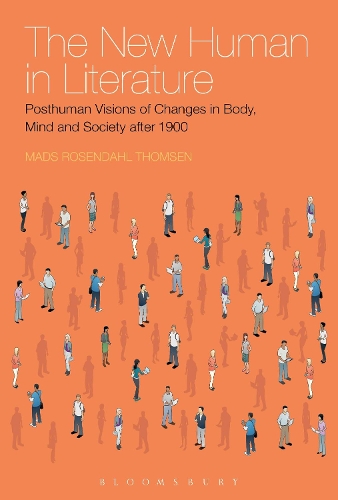
The New Human in Literature: Posthuman Visions of Changes in Body, Mind and Society after 1900
(Paperback)
Available Formats
Publishing Details
The New Human in Literature: Posthuman Visions of Changes in Body, Mind and Society after 1900
By (Author) Dr Mads Rosendahl Thomsen
Bloomsbury Publishing PLC
Bloomsbury Academic
12th March 2015
United Kingdom
Classifications
Tertiary Education
Non Fiction
Literary theory
809.04
Physical Properties
Paperback
256
Width 156mm, Height 234mm
386g
Description
Twentieth-century literature changed understandings of what it meant to be human. Mads Rosendahl Thomsen, in this historical overview, presents a record of literature's changing ideas of mankind, questioning the degree to which literature records and creates visions of the new human. Grounded in the theory of Niklas Luhmann and drawing on canonical works, Thomsen uses literary changes in the mind, body and society to define the new human. He begins with the modernist minds of Virginia Woolf, Williams Carlos Williams and Louis-Ferdinand Celine's, discusses the society-changing concepts envisioned by Chinua Achebe, Mo Yan and Orhan Pamuk. He concludes with science fiction, discussing Don DeLillo and Michel Houellebecq's ideas of revolutionizing man through biotechnology. This is a study about imagination, aesthetics and ethics that demonstrates literature's capacity to not only imagine the future but portray the conflicting desires between individual and various collectives better than any other media. A study that heightens reflections on human evolution and posthumanism.
Reviews
Both a meditation on the status of literature and on that of the human, this book has the tact to treat these two concerns as parallel, but related - not identical. The result is a salutary reminder of the fragility of all "autopoiesis." The New Human in Literature shows how indispensable to ideas of species identity and culture the technological imagination has always been. * Haun Saussy, Professor of Comparative Literature, University of Chicago, USA *
The relevance of literature is to address the problems associated with modern biotechnology and information technology dilemmas without presenting under-complex solutions; the challenge that modern life sciences pose for literature is to find new meaning in the old idea of the "new man". Mads Rosendahl Thomsens study has accomplished to have developed this exchange in a theoretically demanding and rich way. * Nicolas Pethes, Professor, University of Cologne *
The refreshing thing about The New Human is that it tackles the rise of posthumanism - or the intensifying debate about human evolution, transformation and succession, which is led from a variety of angles (the spectrum goes from critical posthumanism to transhumanism one could say) - from a historical angle and thus takes a longer term view (i.e. from around 1900). So even though it is aware of the current environment of vast technological change mainly due to biotechnology and digitalisation, its focus is on how these changes are philosophically and aesthetically underpinned by the rise of the idea of a renewal of humanity (the new human) in modern literature... ...The methodological approach the volume takes is also a major strength... ...One might think, against the run of the argument that this doesnt bode well for the future of literature might there be something essentially humanist about the literary, after all Or are we currently just facing a temporal horizon within literatures history, which momentarily precludes us from imagining a postliterary future in the humanist sense It is arguably the formulation of this paradoxical nature of literature in dealing with the new human that constitutes the most important achievement of Thomsens study. * Stefan Herbrechter in the Bryn Mawr Review of Comparative Literature *
Author Bio
Mads Rosendahl Thomsen is Professor with Special Responsibilities in Comparative Literature at Aarhus University, Denmark. He is the author of Mapping World Literature: International Canonization and Transnational Literature (2008), The New Human in Literature: Posthuman Visions of Changes in Body, Mind and Society (2013), and the editor of several volumes, including World Literature: A Reader (2012) and The Posthuman Condition: Ethics, Aesthetics and Politics of Biotechnological Challenges (2012). He is a member of the Academia Europaea and an advisory board member of the Institute for World Literature.
